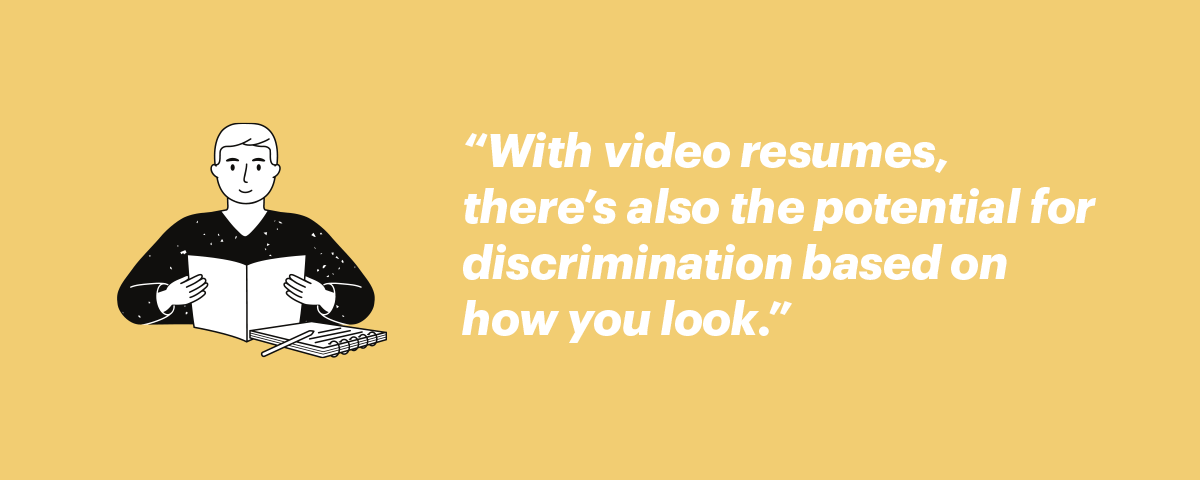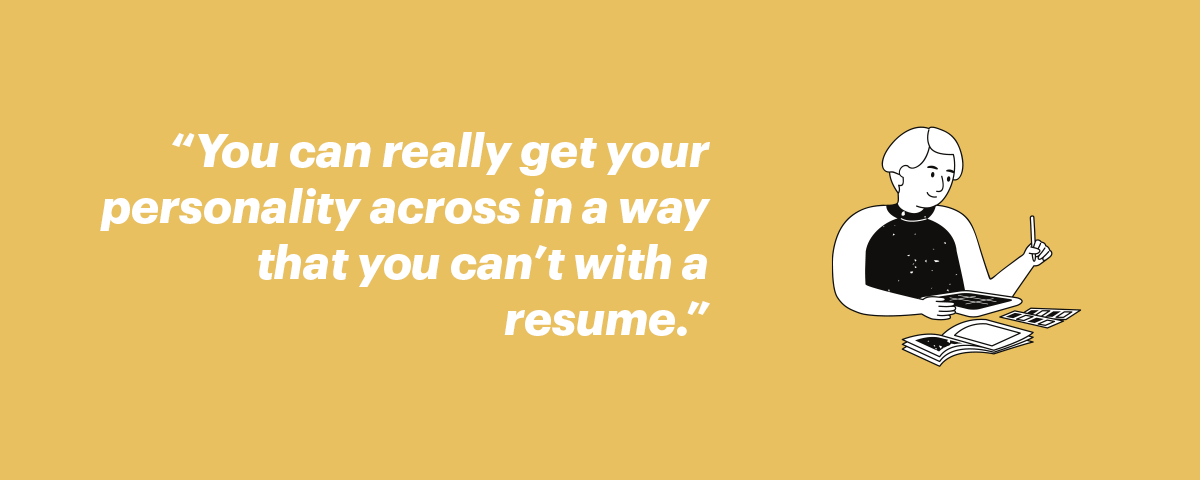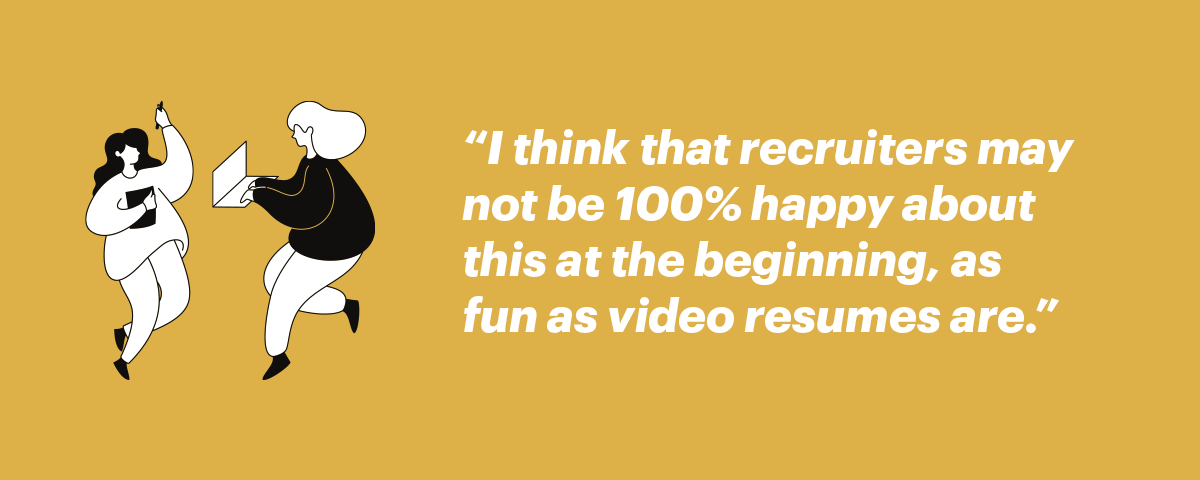Imagine you could get solid job search advice directly from someone with experience in recruiting and HR. Wouldn't that be helpful? Now you can do just that thanks to our new interview series Recruiter Reveals! Every month I interview our resident HR expert Christy Morgan on various job search topics — be it resumes, cover letters, job interviews, or anything marginally career related. |
Not so long ago, all you had to do was write your resume, send it to employers, and wait for them to reply.
With TikTok introducing their new "video resume" feature last month, it may not be long before you're expected to throw some video editing into the mix too.
But as you know, every coin has two sides. Our in-house HR expert Christy has the same thing to say about the video resume.
Let's talk about its pros and cons and a lot more!
In this interview, you'll find out:
- What does Christy think about TikTok's new video resumes;
- What are the pros and cons of video resumes;
- That “video resumes” are more like “video cover letters”;
- Why they're only good as an addition to traditional resumes;
- How to create a video resume;
- Structure example to prepare your own video script;
- Whether video resumes will become the new normal.
This month, TikTok came up with a new idea to offer jobs and allow users to apply for them via video clips. What do you think about video resumes in general?
I'm becoming more enthusiastic about them. I guess I used to be a bit old fashioned and think that it's not really a proper way to do a resume. But now I think that as long as you use them as an enhancement to your resume to add more character, I think they're great. Because you should always have the traditional resume anyway.
Also, more and more organizations are focusing on corporate culture, so it's becoming a bit more acceptable to have video resumes to show your potential culture fit. And they can especially attract the Gen-Z audience and people who are used to taking selfies and endless videos of themselves. I think that to them, it's a much more natural format than the traditional resume. But of course, they should still have the traditional resume too. Because that’s a more detailed record of your work history and qualifications.
But if I understand it correctly, on TikTok job seekers will only apply with a video. Is it a good idea to post such things publicly on a social media platform?
Yes, they're trying to drive traffic there. And TikTok resumes are possibly a good idea, but with conditions. If you're doing that, don't put your last name and other identifying information there. A traditional resume protects you to some extent because you're sending it to a company privately. But if you're putting it online publicly, there's a huge potential for identity theft or stalking and so on.
But I think it’s an interesting experiment. From what I understand, companies have to sign up, and when you upload your resume to TikTok, it will be considered for specific advertised roles by those companies, rather than generally. So it’s not going to be a video resume database... just yet. But the fact that they are public resumes is a big question mark for me. It’d be better if they were private, just like you can set your profile on LinkedIn only for recruiters or LinkedIn members.
If one of your clients decided to do a TikTok video resume now, what would you say to them?
I don't see anything against it, aside from the public setting. Firstly, I'd advise them to take a look at the jobs that are being advertised. Because, if they're not in your area, then I wouldn't share any information right now. But if they decide to do it, I'd advise them to script their video carefully to make sure they're not sharing any identifying information. I'd be very careful about that.

When it comes to TikTok video resumes, privacy is a big weak point. What other cons come with video resumes, in general?
There are some disadvantages, but there are also some things you can do to minimize the cons. For example, if we're talking about TikTok, don't put your identifying information there.
With video resumes, there's also the potential for discrimination based on how you look. You don't have this with a traditional resume where you don't have to include your picture, date of birth, and so on. But with a video, you've got a person right there. And there's a much greater opportunity to discriminate against somebody, subconsciously or otherwise. You can see and hear things like gender, personality, skin colour, accent, speech impediments, and so on. In that respect, video resumes can be a bit of a discrimination minefield.
As far as I know, there are no laws regulating video resume content at the moment. So I feel like with a traditional resume, you're a little bit more protected from discrimination. Because if you're well qualified on paper and then get rejected before or after an interview, usually you feel the outcome is fair, even if you don’t like it. With video resumes, you may potentially see more cases of applicants suing for perceived discrimination if they don’t get interviews or a job.
Anything else?
You need to have some skills for it. There are plenty of tools that you can use to create and edit video resumes, even if you’re not technical or creative. Some are free, some have a cost, and they’re relatively user-friendly. But you do need at least some level of creativity, and the ability to script a short elevator pitch. And it's very different to writing a traditional resume where you can easily google advice. I feel like you also do need to be more aware of how you come across, because you are visually promoting yourself and your personality.
And if you're an introvert, a traditional resume is great, whereas with a video resume, you need to feel comfortable on camera. And many people don't.
That's a bit discriminatory too, isn't it? Some people feel comfortable with doing these videos while some don't — therefore they can't or won’t apply.
Yes, that's the thing too. You could have somebody who's a really great candidate and someone who's a pretty good candidate. But maybe the pretty good one has a really great video, so you'll get a better impression about that person versus the really great candidate. As a recruiter, you try to evaluate candidates based on objective measures, but with video resumes, it becomes kind of tricky.
And how will companies compare a candidate who applies via a job board using a resume with a candidate who applies via a TikTok video resume? That's also tricky.
Exactly. I think that'll come down to the individual companies and how their screening process is. But I think for the moment most companies will offer only one method to keep things simple. The main issue at the moment is that videos aren’t ATS-compatible. So, that complicates things when it comes to adopting video resumes in the screening process.
Also, recruiters often don't have time to go through all resumes. Will they have time to watch videos?
Yes and no. It's said we spend around six seconds looking at a resume. But that's only how long it takes to assess it and decide if we’ll continue reading. So, there's still a lot of reading and skimming time. Whereas a video could potentially speed that up. They can give a much better feel for the candidate much more quickly, and will probably engage the recruiter’s attention for longer, let’s say 30 seconds at least. And it's much more interesting to watch a video than to read a document, let's be honest. So, it's potentially a lot easier for recruiters.
It might also be more time-consuming for job seekers. When you need to tailor each video resume to a company, for instance on TikTok, as all videos are public there.
When you're sending video resumes directly to companies, it's not a big deal if you plan this in advance and script and shoot it in a way that you can go back in and minimally edit a few parts. For example, you could do a voiceover at the beginning to say the company name and job title. Or have these written on the screen, so you don’t need to re-film yourself each time. However, with TikTok it will be interesting to see whether you can upload your resume once, or whether you can edit and upload it for multiple jobs.

On the other hand, what do you think are the main pros of video resumes?
I think there are a lot of pros. I've looked at lots of them lately, and it’s clear that you can really get your personality across in a way that you can't with a resume. A resume is very much an objective document. Sure, the professional summary enables you to communicate a bit of your personality, but it's not the same as somebody seeing you talking. And you've got all those inputs like your accent and your speaking style. Your personality shows a little bit more. And as more companies are becoming personality or culture-driven, that's a huge advantage.
You also get to communicate your message about a particular job much more quickly. If you're applying for a specific position, you can really explain your passion and your key accomplishments and the reasons why you're a good match. You can also keep a recruiter's attention longer. With a traditional resume, it's six seconds. But if you have an engaging video, you can potentially have their attention for the whole video. Which is a lot longer to communicate who you are and build something of a rapport.
Anything else?
You can also apply to jobs a lot more quickly. If you have a master video and instead of verbally saying you want to apply for a position at Amazon, you can have this as text on the screen and it’s easy to edit. Or as a voiceover. Then you’ll possibly save a lot of time in comparison to editing a traditional resume. It's also an attractive format, much more interesting than black and white text.
To sum it up, you think video resumes are ok, but only as an addition to traditional resumes, correct?
Yes. I don’t think the video resume will replace the traditional resume. Even if you're using a video resume to get your foot in the door, they'll almost certainly ask for a copy of your traditional resume at some point. You can't just cram everything into a 60-second video. I'd say a video resume is more like a cover letter. It's basically what it is. It's not a resume.
For what positions is a video resume suitable?
It could, very generally, be suitable for any position. But I think in reality, it's much more suited to communications, customer service, marketing, entertainment, or entry-level roles, as well as younger job seekers and companies where personality is very important. Especially for jobs where communication and presentation is key, this can be great. Because it demonstrates your skills from the very beginning.

When job seekers decide to go for a video resume, what are your tips on how to do it well?
Unless you're a designer, find a tool where it will take you through the steps. For instance, there’s a site called can give a much better feel for the candidate much more quickly that does this. There are many others that’ll pop up if you google “video resume maker”. Some are free, some charge a fee. But a lot of these have templates and take you through the process from start to finish. They also show you examples for inspiration.
Also, script your video resume in advance. Make sure you don't just go “Blablablabla”, because you have very little time to catch the recruiter's attention AND not bore them. Break your script down into different stages and plan what you’d like to communicate in each. Make sure it’s relevant and concise.
Do you have any suggestions on writing the script?
Sure, here's an example how to structure a video resume:
- Start with a short intro. Something like “Hi, my name is Claire and I'm a senior software engineer with 4 years of experience in the textile industry.” Focus on your industry and your role level, aligned to the job you’re applying for.
- Say why you’re applying for that role. Tell them why you're interested in that company position and why you're passionate about this job. Make it specific, not generic.
- Add key accomplishments. Sum up your key accomplishments and qualifications that align with the role you're targeting. Mention 1-2 quantifiable achievements if possible.
- Add recommendations (optional). If you have good feedback from previous employers or clients, use a snippet as proof of the expertise and accomplishments you just mentioned.
- Closing. Sum up again why you’re interested in the job, and share your contact details (ideally on screen, so these can be removed if you’re uploading it publicly).
You can use this structure to do your own script. Then do a few practice rounds to make sure you feel comfortable and that the text flows. When you start to film it, follow the same approach you’d use for a video interview. Look directly at the camera, ensure the background and lighting is good, dress appropriately for the company culture, be enthusiastic, and smile!
Also, use some visual or special effects if you feel comfortable. You can find many after effects templates online. Nowadays, we're used to videos on YouTube and TikTok and so forth competing for our attention this way.
And what not to do?
Don't do it without any preparation and scripting it!
Should you record it as a selfie or have a regular setup?
I think this really depends. If it's for TikTok, these are basically selfies. But if you're doing it for a bigger company and want to impress, use the tools that are available online, as it will look more professional and you'll stand out. But it can still look good also in a selfie format, depending on your technical skills and attention to factors such as background and lighting.
And what would you advise job seekers who don't like doing videos? Should they just skip the job posting if it asks for a video resume, or try to send a traditional one?
Unfortunately, you don't have control over how the company wants the resumes. If they insist on video, you can't force them to take a traditional one. I mean, you can try to send it anyway, but if they won't accept it, there’s nothing you can do currently. That's their choice.
Do you think that video resumes will become the new normal?
I think so. Especially given the pandemic, everything is becoming more digitized. Even virtual interviewing has begun to replace the first stage of interview screening for many companies. I'm hearing more and more that companies are asking candidates to record a video of themselves answering pre-set screening or interview questions. So, with virtual interviewing becoming more common, I can totally imagine video resumes becoming more common, too. TikTok could popularize it as well. It's going to be really interesting to see what happens there.
What does it mean for the future of recruiting?
I think that recruiters may not be 100% happy about this at the beginning, as fun as video resumes are. They'll need to be very careful about potential discrimination, much more than before. ATS can’t parse video resumes, so recruiters won’t be able to use this front-line filtering technology to screen out unsuitable applications.
But I foresee that there'll be some regulations put in place over time. And technology will come along to automatically filter video resumes, just like ATS were developed to screen traditional resumes. There’ll be a lot of money in that for developers, so you can be sure this won’t be too far into the future. I can also see TikTok having to add the option to make your video resumes private, to protect your personal information and data.
Key takeaways: Video resume
Video resumes are a great experiment, but only as an addition to a traditional resume.
- Advantages: You can communicate your message much more quickly, your personality shows a bit more, you can apply to jobs more quickly. It’s also an attractive format.
- Disadvantages: Privacy, potential for discrimination, you need to have some creativity and video editing skills, you need to feel comfortable on a camera.
- How to make a video resume: Use a video resume maker tool, check a few video examples for inspiration, and script your video resume in advance. Then do a few practice rounds to make sure you feel comfortable and that the text flows. When you start to film it, look directly at the camera, ensure the background and lighting is good, dress appropriately and smile. Also, use some visual or special effects if you feel comfortable.




